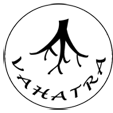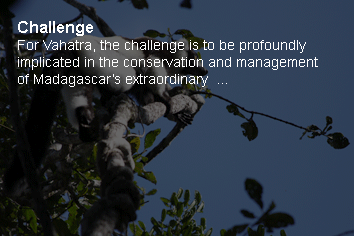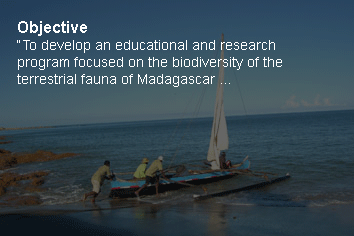Historical perspective
Vahatra is a legally registered International Association of the island nation of Madagascar. The word “vahatra” means “grass-roots” in Malagasy, the national language of the island. The mission of Vahatra is two fold: 1) to contribute to the amelioration of information on the biodiversity of Madagascar, particularly the terrestrial fauna, with the intention of progressing aspects of conservation and 2) to advance a practical program in ecology and conservation biology for young Malagasy naturalists and graduate students in biology.
This association evolved in a natural manner from a WWF-Madagascar project known as “The Ecology Training Program” (ETP), for which the principal philosophy was the development and reinforcement of capacity for Malagasy nationals in ecology and conservation biology. The ETP was initiated in 1991 to advance young Malagasy graduate students working in these domains. The program has also had a major positive impact on the expansion of knowledge of the island’s unique and highly endemic biota. It is not an exaggeration to state that the ETP was a driving force for the development of human capital on Madagascar in the fields of evolutionary biology and on the ecology and diversity of the Malagasy animal fauna. Further, with the availability of more scientifically viable data on the island’s biota, decisions associated with conservation, including the identification of new protected areas, are well supported; the ETP played a critical role in this regard.
In 2007, at the moment that Vahatra became independent of WWF, the ETP had helped advance over 75 Malagasy graduate students earning higher degrees within the national university system in the fields of zoology, ecology or conservation biology and more than 250 students being trained in conservation science in the form of university courses or field schools. In addition, data obtain during ETP field inventories at over 400 sites resulted in the discovery of nearly 50 new species of birds, mammals, reptiles, and amphibians, and the publication of nearly 500 scientific articles. This work was critical in the prioritization of conservation strategies associated with the island’s protected area system.
Given on one hand that the objectives of conservation and management of biodiversity and, on the other hand, few Malagasy nationals with in-depth knowledge of their island’s biodiversity, ETP become a primary vehicle for the education of national scientists with the necessary foundation to make important contributions to biology and the future of conservation efforts of their country. The overwhelming majority of ETP graduates have gone on and obtained prominent posts in the governmental and non-governmental sectors and many retain a strong professional interest in conservation biology, including research and teaching.
To ensure the continuity of this success, we believed that the next logical step in the evolution of the ETP was for it to become an independent organization, led by its graduates, creating visionary scientific programs within a Malagasy construct. To meet this aim, the ETP was turned over to the Association Vahatra in September 2007. A group of former ETP Ph.D. graduates, who are now part of the Malagasy university system, direct Vahatra, which in part continues the basic mandates of the ETP -- to advance Malagasy conservation biologists and research on the island’s biota. Further, Vahatra has launched several new programs, which include, for example, a greater understanding of the impacts of climatic change on vertebrates living in montane portions of the island.
The ETP, as it was previously known, has now become the independent organization Association Vahatra. Vahatra has been quickly recognized by governmental and non-governmental organizations, as one of the primary groups to promote high quality scientific research in the domains of evolutionary and conservation biology and ecology.



